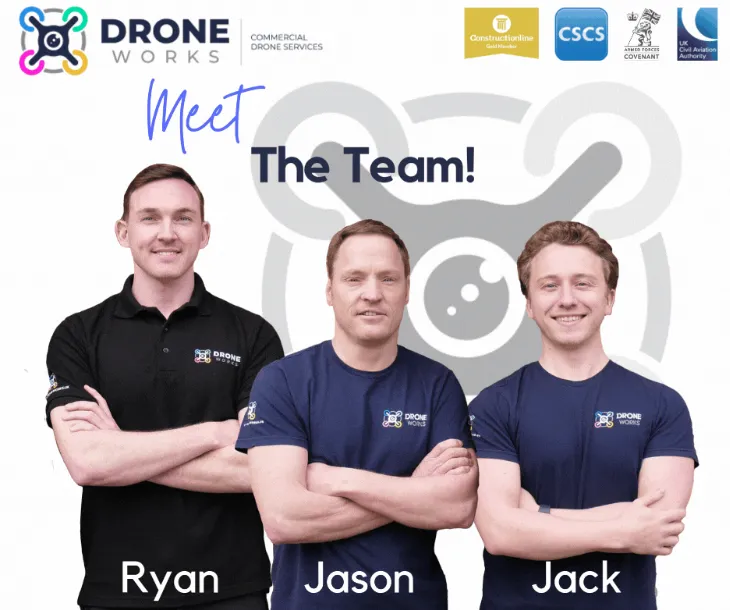
1 year on...: A Day in the Life of a Professional UAS Operator
Can you tell us about your role?
I work as a UAS operator at DroneWorks, leading a range of commercial drone operations.
From LiDAR and Photogrammetry to Manual Inspections and GCP Surveying, I’m usually out in the field either flying, capturing data, or walking in circles around sites placing targets.

What were you doing before joining the drone industry?
Professionally, I was in Cyber Security for a few years.
I feel my time in that role helped me develop a solid technical mindset that I’ve been able to carry over into my current role. However, for three months prior to joining DroneWorks, I was backpacking through Australia and Bali.
During this time, I definitely made the most of my Mini 3 Pro, flying it whenever I could.
I took it everywhere, capturing some stunning footage in incredible locations.
That said, certain parts of Bali weren’t captured — after seeing five or more Minis flying around in some tourist hotspots at the same time, it was a recipe for disaster!
What made you pursue drones professionally?
It all came down to a change in mindset, both personally and professionally.
My partner and I made the decision to focus solely on an industry we genuinely enjoyed, making a few sacrifices along the way. For me, this meant diving deeper into the drone industry.
I was researching everything I could about the UK’s drone sector.
I had no major experience with heavier drones, or drone regulations, so I wasn’t sure where to start.
There were a couple of local drone companies, but none of them were market leaders.
Then I discovered DroneWorks, and was immediately impressed by the technical capabilities and diverse service offerings.
I initially judged the company by its “cover” — but I reached out, and one year later, here I am.

What was your first impression of the industry when you joined?
There’s so much more to it than people often think — from the data collection side to the processing and analysis.
I joined during the summer, and there were a lot of solar farm inspections happening.
The multitasking involved during the flight, especially on cloudy days, was eye-opening.
You’re constantly switching between client-preferred applications, adjusting payloads, and monitoring things like irradiance, lens degree to prevent glare from the sun etc.. (I could go on..!)
The technical side of things became second nature over time, but when I first started, I was taken back at the complexity involved in what seemed like such a straightforward task.
What is the most memorable project you've worked on so far?
A recent one was a LiDAR job spread over 2 days in the southern Welsh hills, laying out GCPs.
It was a tricky one — our planned reflective panel placements didn’t work out due to dense overgrowth and boggy terrain, which we weren't made aware of prior, so we had to improvise while trying to maintain triangulation.
After a full day marking GCPs, we found the next day — post-flight — that two GCPs in separate zones had been removed by someone and were therefore unusable for processing.
At the end of a long day, we managed to re-mark and re-fly one of the affected zones, salvaging what could’ve been a wasted effort, but unfortunately couldn't recover the other one.
When it came to flying, we used a spotter due to the site challenges. The plan was for me to stay on the ground while the spotter hiked up the hills we’d tackled the day before, staying in contact during the flight, and later collecting the GCPs while I prepped the next zone.
Long story short — signal issues meant I had to sprint up another hill with three M350 battery sets, my “pet drone” in tow, and restart the mission from where I had both VLOS and comms.
A drawn-out day, but one I won't be forgetting anytime soon!

What is the biggest thing you have learnt in the past 12 months?
I’ve picked up a huge amount of knowledge I never expected to be involved in — areas like geospatial workflows and civil engineering concepts, which I had no prior exposure to.
However if I keep it specific to flying: Although I felt my flying capability was already at a decent level, I’ve learned how to plan and execute a mission correctly based on the required GSD, and how to manually fly safely and efficiently in challenging or unique environments (with the way more expensive & complex kit).
That includes understanding and adjusting flight parameters like speed, height, lens choice, overlap, ASL/AGL — all to ensure we deliver accurate, reliable data that meets the client’s expectations.
What is the most unglamorous part of drone work that no one talks about?
Definitely marking out GCPs!
It's usually on us to figure out the best way to access and navigate a site — some are more straightforward than others, but many involve awkward terrain, locked gates, shin-deep mud, or long walks through overgrowth.
Not to mention the times of struggling with satellite & internet signal with the GNSS receiver!

Google Earth and Street View can give you a general idea of the site, but working out the most efficient and safe approach isn’t always as easy as it looks.
One job for a LiDAR project I clocked over 25,000 steps in one day. through boggy farmland - remember we don't just put GCPs out, we have to collect the panels back in.
The image on the right shows the unusable GCP someone went out of their way to turn up from the ground.
(At least they were courteous enough to not steal it!)
How does professional drone flying differ from the hobbyist side?
I’d describe hobbyists — as I once was — as those flying sub-250g drones like the DJI Mini series, mainly capturing nice images and videos for personal use.
I’d take mine on hikes, day trips, and I brought it all over Australia and Bali capturing footage of some incredible places.
The benefit of flying as a hobbyist is the minimal restrictions.
You don’t need the qualifications, risk assessments, or approvals that are essential in commercial ops. That said, the work I do now under A2 and GVC certifications, operating under PDRA01 (with BVLOS applications in near future), has taken things to another level.
I can’t imagine going back to just recreational flying — the industry is growing in both intensity and complexity, at a rapid pace.
What do you think is the biggest misconception around being a Drone Pilot?
The biggest misconceptions I often encounter is that people think we’re just “playing a video game,” flying drones around for fun, or spying on people.
While most interactions are positive, there are always some who assume the worst, the common reasons shared with me being those on social media representing the industry negatively.
After explaining the role in more detail — including some of technical details and how we’re focused on collecting data for significant applications — people are usually surprised and more curious about what we do.
I think this is ultimately a good thing for the industry because it creates more understanding and interest in what those in our positions can offer.
What advice would you give someone looking to start a career in drones?

Do your research — especially if your passion is purely the flying side. Everyone’s different, but the technical depth of this industry will surprise most people.
Flying the drone is only one part of a much bigger system. While it’s a vital part, it shares equal importance with the surrounding tools, processes, and software that ultimately turn raw data into usable deliverables.
I’m still learning every day, and while I’ve picked up a lot in a short space of time, I’ve got a long way to go, with new tech & new standards coming in - that’s part of what makes it intriguing.
I'm excited to see what the next 12 months bring, and where we'll be at that stage!
Ready to Get Started?
If you’re considering a drone survey, we’ll guide you through the options, explain what’s included, and help you choose the right solution for your needs.
Remember: A drone survey is an investment in accurate, actionable data that can save you time, money, and headaches down the line. Let’s make your project a success!
If you’re ready to experience the benefits of a drone survey, we’d love to help. Contact us by phone 01772 846229 or post your enquiry via our website.
Let’s discuss how we help you leverage drone technology in your next project.








